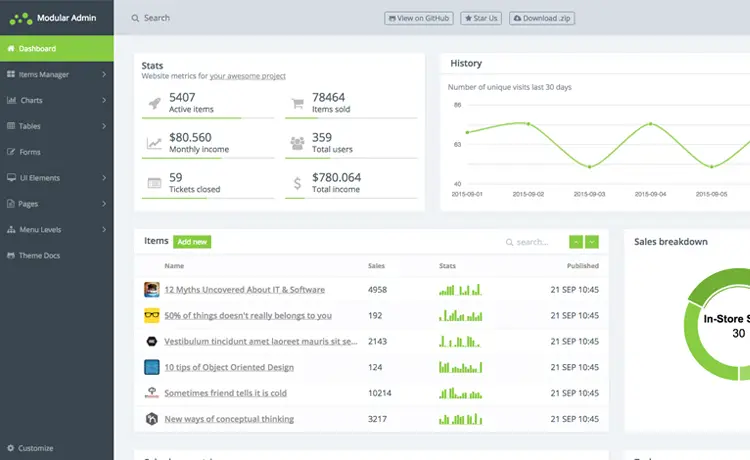How to create a simple progress bars in Python
By Tan Lee Published on Feb 12, 2024 543
First, you need to install the tqdm package by typing this line in your terminal
->pip install tqdm
You can use tqdm to wrap any iterable (e.g., list, range) and display a progress bar as it iterates through the items.
Next, type type this code below in your editor
from tqdm import tqdm
import time
# Example: Progress bar for a loop
for i in tqdm(range(10)):
time.sleep(0.5) # Simulate a task that takes timeIn this example:
tqdm(range(10)): This creates a progress bar that updates as the loop progresses through the range of 10 numbers.time.sleep(0.5): Simulates a task taking time (like a network request or computation).
When you run the code, you'll see a progress bar like this in the terminal:
100%|██████████| 10/10 [00:05<00:00, 2.00it/s]
You can also add a custom description to your progress bar:
for i in tqdm(range(10), desc="Processing items"):
time.sleep(0.5)This will show Processing items before the progress bar.
If you have nested loops and want a progress bar for each, you can use tqdm with nested:
from tqdm import tqdm
for i in tqdm(range(5), desc="Outer loop"):
for j in tqdm(range(10), desc="Inner loop", leave=False):
time.sleep(0.1)This shows a progress bar for both the outer and inner loops.
Another way you can use alive-progress, this is the coolest progress bar ever
->pip install alive-progress
Next, Open your editor then enter the code below
from alive_progress.styles import showtime showtime()
If you don't want to use external packages, you can handle your code by customizing the bar progress symbol "#", bar size, text prefix etc.
Python 3.6+
import sys
import time
def progressbar(it, prefix="", size=60, out=sys.stdout): # Python3.6+
count = len(it)
start = time.time()
def show(j):
x = int(size*j/count)
remaining = ((time.time() - start) / j) * (count - j)
mins, sec = divmod(remaining, 60)
time_str = f"{int(mins):02}:{sec:05.2f}"
print(f"{prefix}[{u'█'*x}{('.'*(size-x))}] {j}/{count} Est wait {time_str}", end='\r', file=out, flush=True)
for i, item in enumerate(it):
yield item
show(i+1)
print("\n", flush=True, file=out)
[████████████████████████████.........................] 24/50 Est wait 00:05.38or usage
import time
for i in progressbar(range(15), "Computing: ", 40):
time.sleep(0.1) # your handle codePython 3.3+
import sys
def progressbar(it, prefix="", size=60, out=sys.stdout): # Python3.3+
count = len(it)
def show(j):
x = int(size*j/count)
print("{}[{}{}] {}/{}".format(prefix, "#"*x, "."*(size-x), j, count),
end='\r', file=out, flush=True)
show(0)
for i, item in enumerate(it):
yield item
show(i+1)
print("\n", flush=True, file=out)Python 2 (old version)
import sys
def progressbar(it, prefix="", size=60, out=sys.stdout):
count = len(it)
def show(j):
x = int(size*j/count)
out.write("%s[%s%s] %i/%i\r" % (prefix, u"#"*x, "."*(size-x), j, count))
out.flush()
show(0)
for i, item in enumerate(it):
yield item
show(i+1)
out.write("\n")
out.flush()I also found a simple function that displays a progress with Python
To use it, just copy the lines in "def update_progress(progress)". Don't forget to import sys. Call it whenever you need to display or update the progress bar.
This works by sending the "\r" symbol directly to the console to move the cursor back to the starting point. "in" in python does not recognize the above symbol for this purpose, hence we need 'sys'
import time, sys
# update_progress() : Displays or updates a console progress bar
## Accepts a float between 0 and 1. Any int will be converted to a float.
## A value under 0 represents a 'halt'.
## A value at 1 or bigger represents 100%
def update_progress(progress):
barLength = 10 # Modify this to change the length of the progress bar
status = ""
if isinstance(progress, int):
progress = float(progress)
if not isinstance(progress, float):
progress = 0
status = "error: progress var must be float\r\n"
if progress < 0:
progress = 0
status = "Halt...\r\n"
if progress >= 1:
progress = 1
status = "Done...\r\n"
block = int(round(barLength*progress))
text = "\rPercent: [{0}] {1}% {2}".format( "#"*block + "-"*(barLength-block), progress*100, status)
sys.stdout.write(text)
sys.stdout.flush()
# update_progress test script
print "progress : 'hello'"
update_progress("hello")
time.sleep(1)
print "progress : 3"
update_progress(3)
time.sleep(1)
print "progress : [23]"
update_progress([23])
time.sleep(1)
print ""
print "progress : -10"
update_progress(-10)
time.sleep(2)
print ""
print "progress : 10"
update_progress(10)
time.sleep(2)
print ""
print "progress : 0->1"
for i in range(101):
time.sleep(0.1)
update_progress(i/100.0)
print ""
print "Test completed"
time.sleep(10)When you execute the program you can see it as show below
progress : 'hello'
Percent: [----------] 0% error: progress var must be float
progress : 3
Percent: [##########] 100% Done...
progress : [23]
Percent: [----------] 0% error: progress var must be float
progress : -10
Percent: [----------] 0% Halt...
progress : 10
Percent: [##########] 100% Done...
progress : 0->1
Percent: [##########] 100% Done...
Test completed





